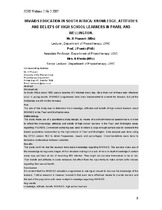| dc.contributor.author | Pharaoh, Hamilton | |
| dc.contributor.author | Frantz, Jose M. | |
| dc.contributor.author | Rhoda, Anthea | |
| dc.date.accessioned | 2017-04-28T12:34:05Z | |
| dc.date.available | 2017-04-28T12:34:05Z | |
| dc.date.issued | 2007 | |
| dc.identifier.citation | Pharaoh, H. et al. (2007). HIV/AIDS education in South Africa: knowledge, attitudes and beliefs of high school learners in Paarl and Wellington. Journal of Community and Health Sciences, 2(2): 9-20 | en_US |
| dc.identifier.issn | 1990-9403 | |
| dc.identifier.uri | http://hdl.handle.net/10566/2771 | |
| dc.identifier.uri | http://jchs.epubs.ac.za/index.php/jchs/article/view/14/11 | |
| dc.description.abstract | INTRODUCTION:
In South Africa about 1500 people become HIV infected every day. More than half of these new infections
occur in young people. HIV/AIDS programmes have been implemented to combat the disease, but yet the
incidences are still on the increase.
AIM:
The aim of this study was to determine the knowledge, attitudes and beliefs of high school learners about
HIV/AIDS in the Paarl and Wellington area.
Methodology:
This study made use of a quantitative study design, by means of a self-administered questionnaire in order
to reflect the knowledge, attitudes and beliefs of high school learners in the Paarl and Wellington areas
regarding HIV/AIDS. Convenient sampling was used to obtain a large enough sample size to represent the
learner population represented by the high schools in Paarl and Wellington. Data analysis was done using
the SPSS version 10.0 to obtain frequencies, means and percentages. Cross-tabulations were done to
determine relationships between variables.
RESULTS:
This study confirms that the learners have basic knowledge regarding HIV/AIDS. The learners make use of
this knowledge during some stages of their decision-making but a lack of more in-depth knowledge in certain
areas may put them at risk of becoming HIV infected. They might not perceive themselves to be at risk.
Their beliefs and attitudes in some instances did afford them the opportunity to make certain safer choices
regarding their sexual health.
CONCLUSION:
It is evident that the HIV/AIDS education programmes is making an impact to improve the knowledge of the
learners. Further research is however needed to find even more effectives means to provide learners and
the rest of the population with more in-depth knowledge regarding HIV/AIDS | en_US |
| dc.language.iso | en | en_US |
| dc.publisher | University of the Western Cape | en_US |
| dc.rights | This journal provides immediate open access to its content on the principle that making research freely available to the public supports a greater global exchange of knowledge. | |
| dc.subject | Knowledge | en_US |
| dc.subject | Attitude | en_US |
| dc.subject | Beliefs | en_US |
| dc.subject | HIV/AIDS | en_US |
| dc.subject | High school learners | en_US |
| dc.title | HIV/AIDS education in South Africa: knowledge, attitudes and beliefs of high school learners in Paarl and Wellington | en_US |
| dc.type | Article | en_US |
| dc.privacy.showsubmitter | FALSE | |
| dc.status.ispeerreviewed | TRUE | |

